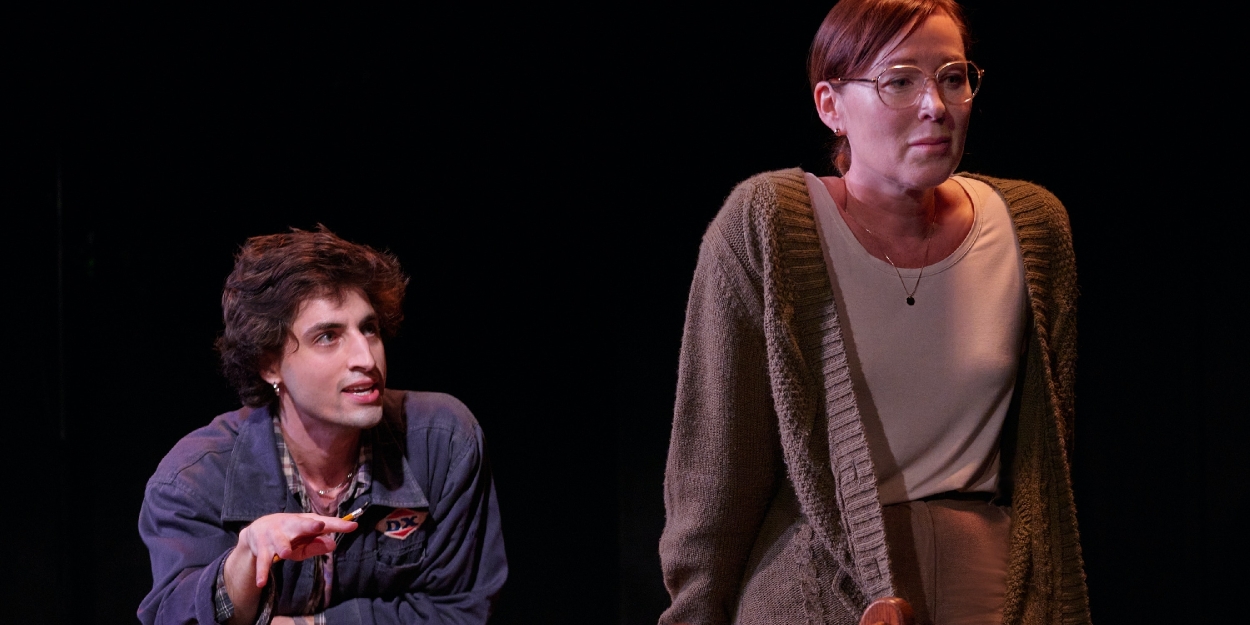Review: THE SOUND INSIDE at Coal Mine Theatre
Coal Mine's "sound" resonates and echoes

I’m writing this review of Adam Rapp’s painful and resonant THE SOUND INSIDE, now playing at Coal Mine Theatre, while traveling to my sixteenth college reunion at a small Ivy League institution. When I get there, I’ll swap stories with friends about what we’re doing now. Many of my fellow English majors and I will talk about our work as English professors, argue about whether or not ChatGPT means the end of the essay as we know it, and remember fondly back to when we were freshmen about to take on the world with novels only our voices could tell. We’ll greet our favourite faculty from way back when and share a drink, reflecting on whether life has gone the way we’d planned, and remember promising colleagues whose lives were cut too short.
All this is to say that Rapp’s play, about a Yale creative writing professor facing down a terrible illness, and her relationship with a challenging student of whom she asks an impossible favour, has lived in my mind since I saw it, and has proven difficult to write about. It’s a familiar story that goes in new directions; it’s mesmerizingly told, and acted with chemistry and grace by its cast of two.
Bella Baird (an artificially frumpy but genuinely fiery Moya O’Connell) teaches writing and literature courses to passionate first-year students, a plum gig earned off the promising reviews of a literary sci-fi debut that’s now almost 20 years old. Dealing with middle age and a manuscript drought that’s “almost” embarrassing, she’s also realizing that her closest relationships come with page numbers. Bella narrates her life to us with a flair for sketching together character with a few stray descriptive markings, while packing her inner life full of theory and metaphor.
It could easily become a tiresome device if the writing weren’t as sharp as it is, and if Bella weren’t so devastatingly blunt about her own shortcomings. Her sensual details of her reading life flare with a passion that’s completely absent in her fumbling acquaintances with those around her; she’s “a whore for first editions” and reads James Salter’s Light Years annually as though it’s a “same time next year” arrangement, but can barely name a single friend.
Bella’s breaking point comes when two things happen: first, she’s diagnosed with an aggressive stomach cancer with a poor prognosis, reminding her of how she watched her mother fade away from illness and lose herself both mentally and physically. Second, she’s sought out repeatedly by Christopher Dunn (Aidan Correia), a cocksure freshman with something to prove, a burning hatred for Yale’s office hour scheduling system, and an intense desire to discuss the novella he’s writing (on his typewriter, of course).
Christopher is instantly recognizable as That Guy from Lit 101 who’s obsessed with Dostoevsky and considers himself an advanced thinker; Correia strides into Bella’s office (simply but effectively suggested by set designer Wes Babcock with some chairs and a desk) with a grinning, intensely punchable face and a manspreading sprawl that suggests he’s immediately staking his claim. It’s only the sensitivity in his observations about writing and his vulnerable need for approval at the core of it all that makes him tolerable, giving him a certain magnetism that keeps Bella interested in his visits. The two form a jagged, conspiratorial bond that borders on the inappropriate, sharing dinners and wine as the truth of Bella’s life becomes not stranger than the fiction she reads, but instead the stultifyingly, horrifyingly mundane prospect of a terminal illness.
If you think you know where the play is going from this, you don’t. This isn’t WIT and it’s not OLEANNA, and it’s not one of a hundred novels where a middle-aged professor finds “love” with a nubile young thing. Instead, it’s a meditation on control and agency that seeps from the written word into the physical plane. It asks whether we can root for a villain, whether certain acts are unforgivable or loving, and what right we might have to end a story on our own terms – or ask someone else to do it for us.
As meticulous and as brazen as both Bella and Christopher are in choosing their words, and as much as each develops a character as an author surrogate (Bella in Billy Baird, a young man who vows to run through a wall in defiance of physics, and Christopher in a narrator who takes over a stranger’s life), neither is completely able to map out the path their own lives will take. O’Connell and Correia are fully committed to the weighty text, creating a small bubble between the two of them while speaking out to the audience, inviting us to read their interactions like voyeurs.
The craft in Rapp’s work is pretty stunning, weaving motifs and metaphors throughout the one-act. It’s impressive when a mere switch in who’s narrating can feel so weighted with meaning. That’s not to say it doesn’t occasionally get too ambitious; even in its emotional beauty, the ending feels like a reach to make things too clever again by half. But just like Bella forgives Christopher his overeager posturing, it’s a forgivable stretch with admirable ambition.
THE SOUND INSIDE deals with much potentially triggering content. While it is a gorgeous show, it is also a haunting one, perhaps even harrowing if you feel you know (or have been) one or both of the people on stage. Its match of a complicated script to a simple presentation is effective and moving, and it’s likely to sit inside you, making a small, insistent sound, as you introduce the next crop of literature students to the thesis statement, thinking about how we write our lives.
Photo of Aidan Correia and Moya O'Connell by Tim Leyes
Add Your Comment
Videos

